UNIT 11 CONFLICT AND COMPROMISE LESSON 1 Living In a Community课件4(共31张PPT,内镶嵌视频)-高中英语北师大版(2019)选择性必修
文档属性
| 名称 | UNIT 11 CONFLICT AND COMPROMISE LESSON 1 Living In a Community课件4(共31张PPT,内镶嵌视频)-高中英语北师大版(2019)选择性必修 |
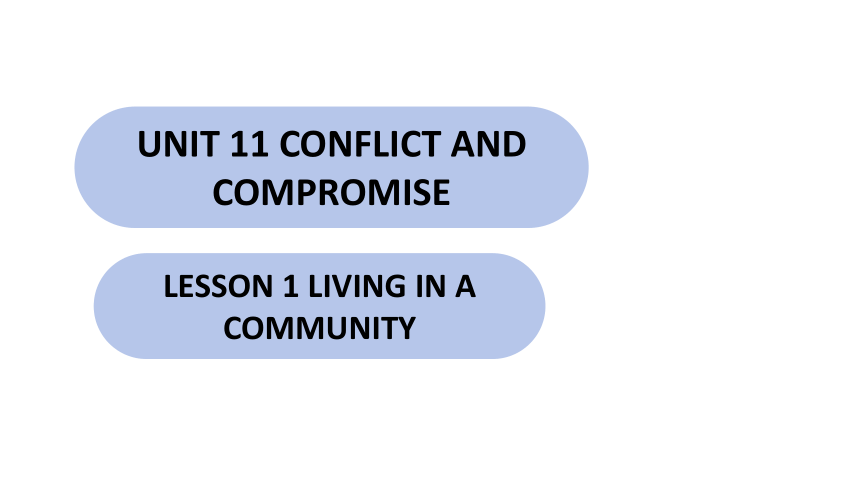
|
|
| 格式 | pptx | ||
| 文件大小 | 64.4MB | ||
| 资源类型 | 教案 | ||
| 版本资源 | 北师大版(2019) | ||
| 科目 | 英语 | ||
| 更新时间 | 2025-04-01 19:51:53 | ||
图片预览

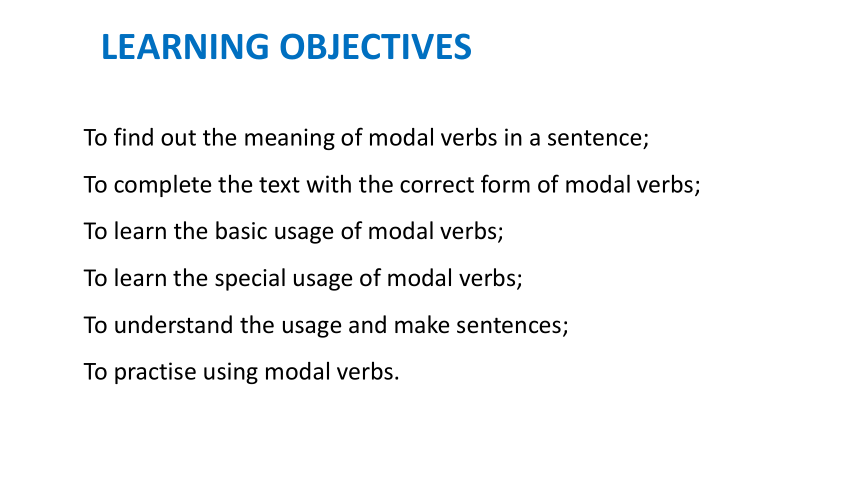
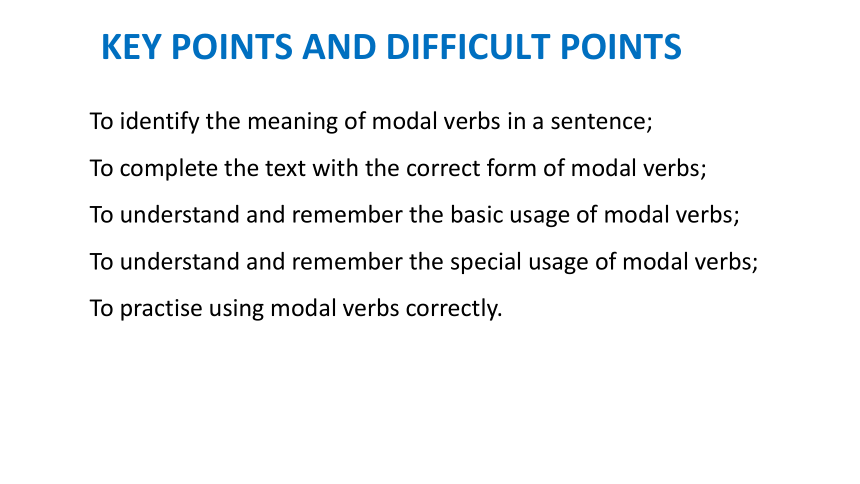
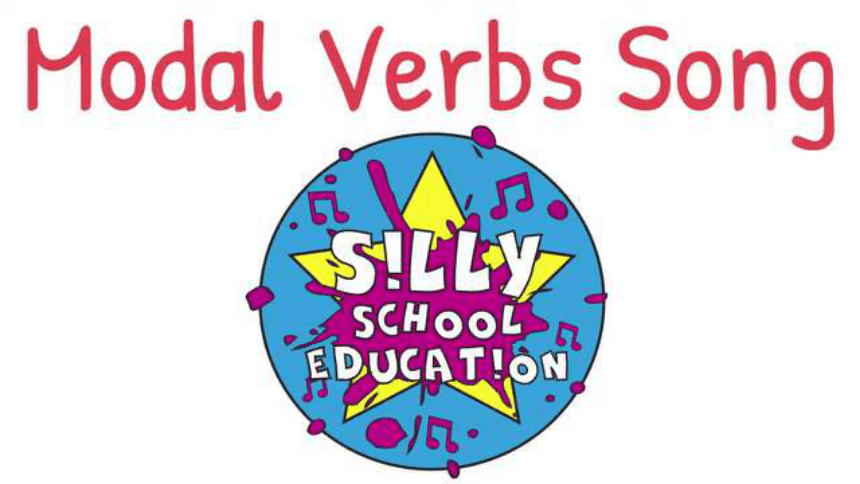
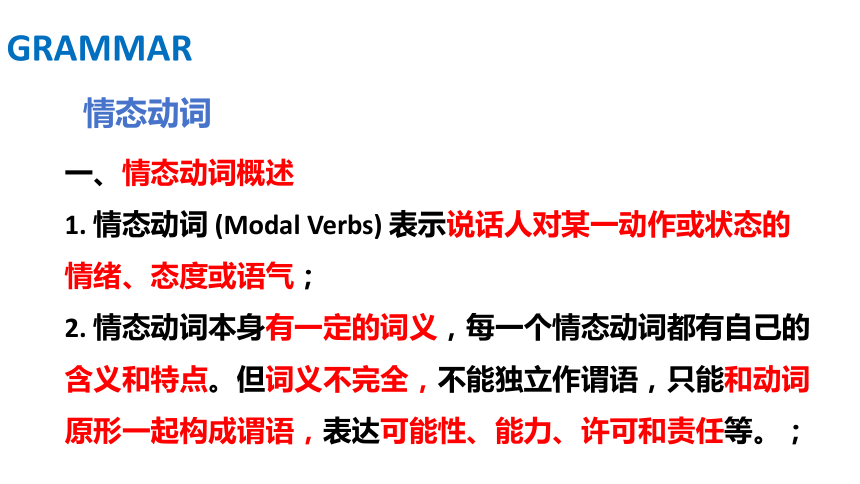
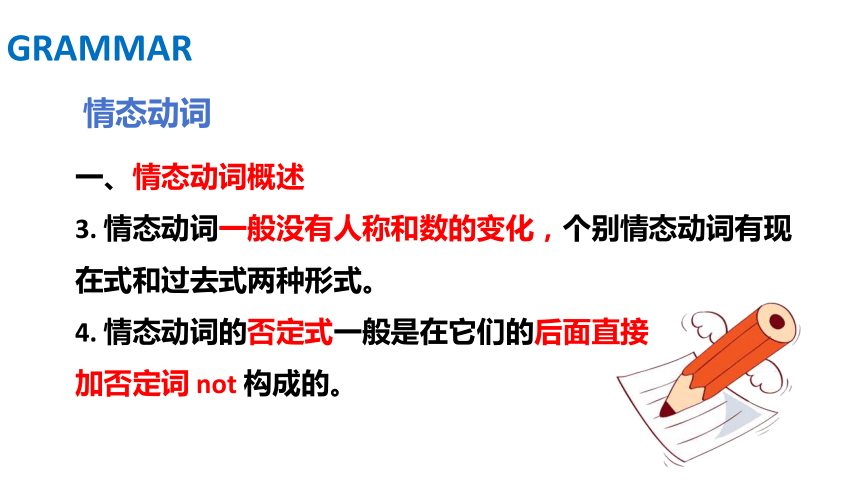
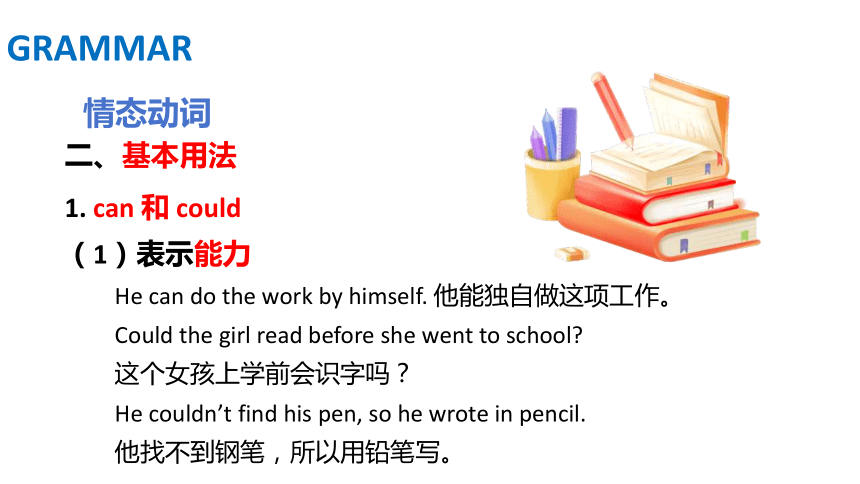


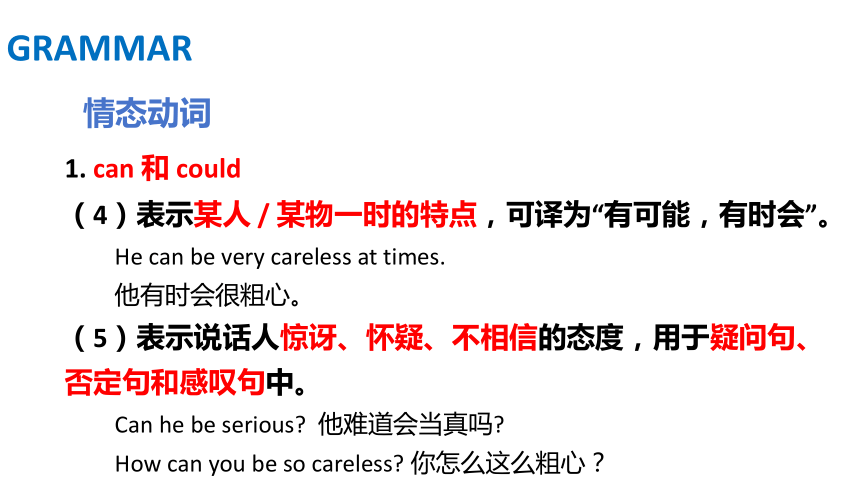
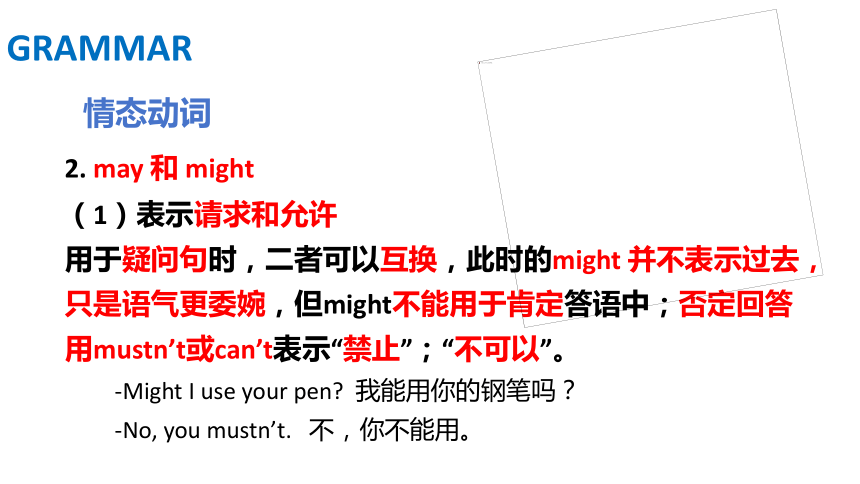
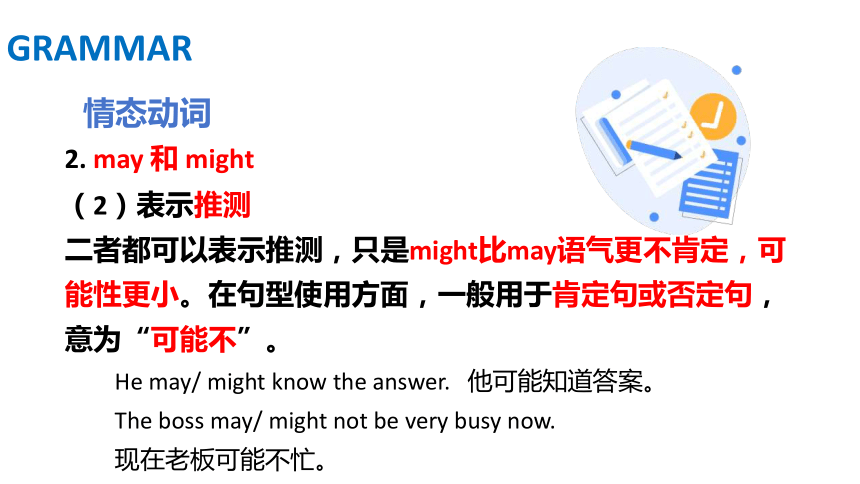
文档简介
(共31张PPT)
LESSON 1 LIVING IN A COMMUNITY
UNIT 11 CONFLICT AND COMPROMISE
LEARNING OBJECTIVES
To find out the meaning of modal verbs in a sentence;
To complete the text with the correct form of modal verbs;
To learn the basic usage of modal verbs;
To learn the special usage of modal verbs;
To understand the usage and make sentences;
To practise using modal verbs.
KEY POINTS AND DIFFICULT POINTS
To identify the meaning of modal verbs in a sentence;
To complete the text with the correct form of modal verbs;
To understand and remember the basic usage of modal verbs;
To understand and remember the special usage of modal verbs;
To practise using modal verbs correctly.
GRAMMAR
情态动词
一、情态动词概述
1. 情态动词 (Modal Verbs) 表示说话人对某一动作或状态的情绪、态度或语气;
2. 情态动词本身有一定的词义,每一个情态动词都有自己的含义和特点。但词义不完全,不能独立作谓语,只能和动词原形一起构成谓语,表达可能性、能力、许可和责任等。;
GRAMMAR
情态动词
一、情态动词概述
3. 情态动词一般没有人称和数的变化,个别情态动词有现在式和过去式两种形式。
4. 情态动词的否定式一般是在它们的后面直接
加否定词 not 构成的。
GRAMMAR
情态动词
二、基本用法
1. can 和 could
(1)表示能力
He can do the work by himself. 他能独自做这项工作。
Could the girl read before she went to school
这个女孩上学前会识字吗?
He couldn’t find his pen, so he wrote in pencil.
他找不到钢笔,所以用铅笔写。
GRAMMAR
情态动词
1. can 和 could
(2)表示推测(常用于否定句和疑问句)
表示推测时can通常只用于否定句或疑问句,一般不用于肯定句;could均可,两者没有时间上的差别,只是could比can更委婉,更不确定。
He can’t be over sixty. 他不可能超过 60 岁。
Can this story be true 这个故事会是真的吗?
GRAMMAR
情态动词
1. can 和 could
(3)表示许可和请求(could 用来表示“请求”时,是委婉的说法,回答时只能用 can)。用于疑问句时,二者可以互换,此时的could并不表示过去,只是语气更委婉,但could不能用于肯定句和答语中。
You can use my dictionary now. 你现在可以用我的词典。
-Could I have a look at your new pen 我可以看一看你的新钢笔吗?
-Of course you can. 当然可以。
GRAMMAR
情态动词
1. can 和 could
(4)表示某人 / 某物一时的特点,可译为“有可能,有时会”。
He can be very careless at times.
他有时会很粗心。
(5)表示说话人惊讶、怀疑、不相信的态度,用于疑问句、否定句和感叹句中。
Can he be serious 他难道会当真吗
How can you be so careless 你怎么这么粗心?
GRAMMAR
情态动词
2. may 和 might
(1)表示请求和允许
用于疑问句时,二者可以互换,此时的might 并不表示过去,只是语气更委婉,但might不能用于肯定答语中;否定回答用mustn’t或can’t表示“禁止”;“不可以”。
-Might I use your pen 我能用你的钢笔吗?
-No, you mustn’t. 不,你不能用。
GRAMMAR
情态动词
2. may 和 might
(2)表示推测
二者都可以表示推测,只是might比may语气更不肯定,可能性更小。在句型使用方面,一般用于肯定句或否定句,意为“可能不”。
He may/ might know the answer. 他可能知道答案。
The boss may/ might not be very busy now.
现在老板可能不忙。
GRAMMAR
情态动词
2. may 和 might
(3)表示可能性
may 或 might 可以表示可能性,表示“某人可能做某事”或“将来某事有可能发生”,用might 则语气更加不肯定。
He may/ might get there on time, but I’m not sure.
他有可能准时到达,但我不确定。
I may/ might go to Alaska one day.
将来有一天我可能会去阿拉斯加。
GRAMMAR
情态动词
2. may 和 might
(4)表示祝愿
may可以作为一种祝愿用法,表示对他人的美好祝愿、希望和祈祷。这种用法通常出现在较正式的场合或书面语境。 May you have a wonderful new year! 愿你新的一年幸福安康!
May your journey be safe and enjoyable! 祝你旅途平安愉快!
May success and good fortune follow you wherever you go!
愿成功和好运随时陪伴你!
GRAMMAR
情态动词
3. will 和 would
(1)表示请求、建议等
用于疑问句。表达此意时,主要用于第二人称的疑问句中,would 此时并不表过去,而表示委婉语气。
Will you close the window It’s a bit cold.
请你把窗户关上,好吗?有点儿冷。
Would you mind cleaning the window
你介意把窗户擦一下吗?
GRAMMAR
情态动词
3. will 和 would
(2)表示某种倾向或习惯
will表示现在的倾向或习惯,would表示过去的倾向或习惯。
Fish will die out of water. 鱼离开水就会死掉。
The boy will sit there hour after hour looking at people going by.
那个男孩常常坐在那里好几个钟头,看着人们走过。
Every time she was in trouble, she would go to him for help.
每次遇到麻烦,她都会向他求助。
GRAMMAR
情态动词
3. will 和 would
(3)表示意志、愿望和决心
will表示现在的意愿,would表示过去的意愿。
She will join us. We are very happy.
她愿意加入我们。我们特别开心。
He asked me if I would go to see the football match with him.
他问我是否愿意和他一起去看足球赛。
GRAMMAR
情态动词
4. must
(1)表示义务等
主观看法,意为“必须,一定”,回答must引导的一般疑问句,如果作否定回答,要用needn’t 或don’t have to,而不能用mustn’t。
-Must we hand in our exercise books now
我们现在必须要交练习本吗?
-No,you needn’t/don’t have to. 不,不必。
GRAMMAR
情态动词
4. must
(2)表示推测,意为“肯定,一定”,只用于肯定句。
You’re Tom’s friend, so you must know what he likes best.
你是汤姆的朋友,所以你一定知道他最喜欢什么。
He must be ill. He looks so pale.
他一定是生病了。他脸色特别苍白。
You must be hungry after the long walk.
走了很远的路你一定饿了。
GRAMMAR
情态动词
4. must
(3)must的否定形式是mustn’t ,表示禁止,意为“不得,不允许;一定不要”。
You mustn’t play with the knife, or you may hurt yourself.
你千万不要玩刀,否则会伤到自己的。
You mustn’t speak like that to your mother.
不准你那样和你的母亲说话。
GRAMMAR
情态动词
5. shall
(1)表示征求对方意见或许可
shall用于疑问句,表示征求对方意见或许可, 表达此意时多用于第一、第三人称。
Shall I get you some tea 我给你点儿茶,好吗?
Shall the boy wait outside 让那男孩在外面等吗?
What shall we do this evening 我们今晚做什么?
GRAMMAR
情态动词
5. shall
(2)表示表示说话人的意图、意志、命令、允诺、警告或必然结果等。在法律、条约、协定等文件中,shall 表示义务、规定等。用于第二、三人称的陈述句。
You shall do as I say. 按我说的做。
You shall have my answer tomorrow.
你明天可以得到我的答复。
You shall be sorry for it one day. 有一天你会对此后悔的。
GRAMMAR
情态动词
6. should
(1)表示责任或义务,意为“应该”
You shouldn’t waste time. 你不应该浪费时间。
You should be polite to your teachers.
你对你的老师应该有礼貌。
The diet should be maintained unchanged for about a year.
这样的饮食应保持约一年不变。
Should our children be taught to swim at school
我们的孩子应该在学校学习游泳吗?
GRAMMAR
情态动词
6. should
(2)表示劝告、建议或命令。否定形式为shouldn’t
You should stop talking. 你应该戒烟。
You should brush your teeth before you go to bed.
睡觉前你要刷牙。
We should protect the environment. 我们应该保护环境。
You shouldn't talk in class.
你不许在课堂上讲话。
PRACTICE
1. ________________ we have a race to the end of the beach
2. Her parents paid many debts so that she _______________ go abroad to have a good education.
3. In theory, these machines ________________ last for ten years or more.
4. All students without exception _______________ take the English examination according to the document.
Shall
could
should
must
PRACTICE
5. The situation _______________ all too easily have become a disaster.
6. The negotiation _______________ be influenced by a multiplicity of different factors.
7. The research reveals that computer games _______________ cause aggression.
8. ________________ you please tell me the way to the hospital
might
can
may
Will/ Would
SUMMARY
Find out and identify the meaning of modal verbs in a sentence;
Complete the text with the correct form of modal verbs;
Understand and learn the basic usage of modal verbs;
Understand and learn the special usage of modal verbs;
Understand the usage and make sentences;
Learn and practise using modal verbs.
Thank you
LESSON 1 LIVING IN A COMMUNITY
UNIT 11 CONFLICT AND COMPROMISE
LEARNING OBJECTIVES
To find out the meaning of modal verbs in a sentence;
To complete the text with the correct form of modal verbs;
To learn the basic usage of modal verbs;
To learn the special usage of modal verbs;
To understand the usage and make sentences;
To practise using modal verbs.
KEY POINTS AND DIFFICULT POINTS
To identify the meaning of modal verbs in a sentence;
To complete the text with the correct form of modal verbs;
To understand and remember the basic usage of modal verbs;
To understand and remember the special usage of modal verbs;
To practise using modal verbs correctly.
GRAMMAR
情态动词
一、情态动词概述
1. 情态动词 (Modal Verbs) 表示说话人对某一动作或状态的情绪、态度或语气;
2. 情态动词本身有一定的词义,每一个情态动词都有自己的含义和特点。但词义不完全,不能独立作谓语,只能和动词原形一起构成谓语,表达可能性、能力、许可和责任等。;
GRAMMAR
情态动词
一、情态动词概述
3. 情态动词一般没有人称和数的变化,个别情态动词有现在式和过去式两种形式。
4. 情态动词的否定式一般是在它们的后面直接
加否定词 not 构成的。
GRAMMAR
情态动词
二、基本用法
1. can 和 could
(1)表示能力
He can do the work by himself. 他能独自做这项工作。
Could the girl read before she went to school
这个女孩上学前会识字吗?
He couldn’t find his pen, so he wrote in pencil.
他找不到钢笔,所以用铅笔写。
GRAMMAR
情态动词
1. can 和 could
(2)表示推测(常用于否定句和疑问句)
表示推测时can通常只用于否定句或疑问句,一般不用于肯定句;could均可,两者没有时间上的差别,只是could比can更委婉,更不确定。
He can’t be over sixty. 他不可能超过 60 岁。
Can this story be true 这个故事会是真的吗?
GRAMMAR
情态动词
1. can 和 could
(3)表示许可和请求(could 用来表示“请求”时,是委婉的说法,回答时只能用 can)。用于疑问句时,二者可以互换,此时的could并不表示过去,只是语气更委婉,但could不能用于肯定句和答语中。
You can use my dictionary now. 你现在可以用我的词典。
-Could I have a look at your new pen 我可以看一看你的新钢笔吗?
-Of course you can. 当然可以。
GRAMMAR
情态动词
1. can 和 could
(4)表示某人 / 某物一时的特点,可译为“有可能,有时会”。
He can be very careless at times.
他有时会很粗心。
(5)表示说话人惊讶、怀疑、不相信的态度,用于疑问句、否定句和感叹句中。
Can he be serious 他难道会当真吗
How can you be so careless 你怎么这么粗心?
GRAMMAR
情态动词
2. may 和 might
(1)表示请求和允许
用于疑问句时,二者可以互换,此时的might 并不表示过去,只是语气更委婉,但might不能用于肯定答语中;否定回答用mustn’t或can’t表示“禁止”;“不可以”。
-Might I use your pen 我能用你的钢笔吗?
-No, you mustn’t. 不,你不能用。
GRAMMAR
情态动词
2. may 和 might
(2)表示推测
二者都可以表示推测,只是might比may语气更不肯定,可能性更小。在句型使用方面,一般用于肯定句或否定句,意为“可能不”。
He may/ might know the answer. 他可能知道答案。
The boss may/ might not be very busy now.
现在老板可能不忙。
GRAMMAR
情态动词
2. may 和 might
(3)表示可能性
may 或 might 可以表示可能性,表示“某人可能做某事”或“将来某事有可能发生”,用might 则语气更加不肯定。
He may/ might get there on time, but I’m not sure.
他有可能准时到达,但我不确定。
I may/ might go to Alaska one day.
将来有一天我可能会去阿拉斯加。
GRAMMAR
情态动词
2. may 和 might
(4)表示祝愿
may可以作为一种祝愿用法,表示对他人的美好祝愿、希望和祈祷。这种用法通常出现在较正式的场合或书面语境。 May you have a wonderful new year! 愿你新的一年幸福安康!
May your journey be safe and enjoyable! 祝你旅途平安愉快!
May success and good fortune follow you wherever you go!
愿成功和好运随时陪伴你!
GRAMMAR
情态动词
3. will 和 would
(1)表示请求、建议等
用于疑问句。表达此意时,主要用于第二人称的疑问句中,would 此时并不表过去,而表示委婉语气。
Will you close the window It’s a bit cold.
请你把窗户关上,好吗?有点儿冷。
Would you mind cleaning the window
你介意把窗户擦一下吗?
GRAMMAR
情态动词
3. will 和 would
(2)表示某种倾向或习惯
will表示现在的倾向或习惯,would表示过去的倾向或习惯。
Fish will die out of water. 鱼离开水就会死掉。
The boy will sit there hour after hour looking at people going by.
那个男孩常常坐在那里好几个钟头,看着人们走过。
Every time she was in trouble, she would go to him for help.
每次遇到麻烦,她都会向他求助。
GRAMMAR
情态动词
3. will 和 would
(3)表示意志、愿望和决心
will表示现在的意愿,would表示过去的意愿。
She will join us. We are very happy.
她愿意加入我们。我们特别开心。
He asked me if I would go to see the football match with him.
他问我是否愿意和他一起去看足球赛。
GRAMMAR
情态动词
4. must
(1)表示义务等
主观看法,意为“必须,一定”,回答must引导的一般疑问句,如果作否定回答,要用needn’t 或don’t have to,而不能用mustn’t。
-Must we hand in our exercise books now
我们现在必须要交练习本吗?
-No,you needn’t/don’t have to. 不,不必。
GRAMMAR
情态动词
4. must
(2)表示推测,意为“肯定,一定”,只用于肯定句。
You’re Tom’s friend, so you must know what he likes best.
你是汤姆的朋友,所以你一定知道他最喜欢什么。
He must be ill. He looks so pale.
他一定是生病了。他脸色特别苍白。
You must be hungry after the long walk.
走了很远的路你一定饿了。
GRAMMAR
情态动词
4. must
(3)must的否定形式是mustn’t ,表示禁止,意为“不得,不允许;一定不要”。
You mustn’t play with the knife, or you may hurt yourself.
你千万不要玩刀,否则会伤到自己的。
You mustn’t speak like that to your mother.
不准你那样和你的母亲说话。
GRAMMAR
情态动词
5. shall
(1)表示征求对方意见或许可
shall用于疑问句,表示征求对方意见或许可, 表达此意时多用于第一、第三人称。
Shall I get you some tea 我给你点儿茶,好吗?
Shall the boy wait outside 让那男孩在外面等吗?
What shall we do this evening 我们今晚做什么?
GRAMMAR
情态动词
5. shall
(2)表示表示说话人的意图、意志、命令、允诺、警告或必然结果等。在法律、条约、协定等文件中,shall 表示义务、规定等。用于第二、三人称的陈述句。
You shall do as I say. 按我说的做。
You shall have my answer tomorrow.
你明天可以得到我的答复。
You shall be sorry for it one day. 有一天你会对此后悔的。
GRAMMAR
情态动词
6. should
(1)表示责任或义务,意为“应该”
You shouldn’t waste time. 你不应该浪费时间。
You should be polite to your teachers.
你对你的老师应该有礼貌。
The diet should be maintained unchanged for about a year.
这样的饮食应保持约一年不变。
Should our children be taught to swim at school
我们的孩子应该在学校学习游泳吗?
GRAMMAR
情态动词
6. should
(2)表示劝告、建议或命令。否定形式为shouldn’t
You should stop talking. 你应该戒烟。
You should brush your teeth before you go to bed.
睡觉前你要刷牙。
We should protect the environment. 我们应该保护环境。
You shouldn't talk in class.
你不许在课堂上讲话。
PRACTICE
1. ________________ we have a race to the end of the beach
2. Her parents paid many debts so that she _______________ go abroad to have a good education.
3. In theory, these machines ________________ last for ten years or more.
4. All students without exception _______________ take the English examination according to the document.
Shall
could
should
must
PRACTICE
5. The situation _______________ all too easily have become a disaster.
6. The negotiation _______________ be influenced by a multiplicity of different factors.
7. The research reveals that computer games _______________ cause aggression.
8. ________________ you please tell me the way to the hospital
might
can
may
Will/ Would
SUMMARY
Find out and identify the meaning of modal verbs in a sentence;
Complete the text with the correct form of modal verbs;
Understand and learn the basic usage of modal verbs;
Understand and learn the special usage of modal verbs;
Understand the usage and make sentences;
Learn and practise using modal verbs.
Thank you
同课章节目录
- Unit 10 Connections
- Lesson 1 How Closely Connected Are We?
- Lesson 2 Community Spirit
- Lesson 3 Anne of Green Gables
- Unit 11 Conflict And Compromise
- Lesson 1 Living In a Community
- Lesson 2 Dealing with Conflict
- Lesson 3 War Memories
- Unit 12 Innovation
- Lesson 1 Scientific Breakthroughs
- Lesson 2 Aha Moment
- Lesson 3 Stephen Hawking
